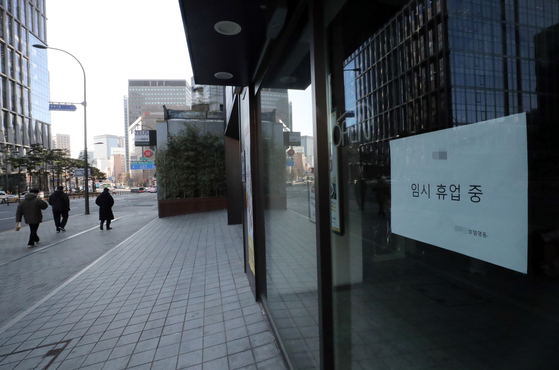![On the 29th, a notice notifying the closure of the business is hanging at a hotel in Myeong-dong, Seoul, which is temporarily closed due to the aftermath of Corona 19. [뉴스1]](https://i0.wp.com/pds.joins.com/news/component/htmlphoto_mmdata/202101/31/8d46fe66-f5e0-4865-b1e6-4ca8b455993a.jpg?w=560&ssl=1)
On the 29th, a notice notifying the closure of the business is hanging at a hotel in Myeong-dong, Seoul, which is temporarily closed due to the aftermath of Corona 19. [뉴스1]
In the past year, when the novel coronavirus infection (Corona 19) spread, 8 out of 10 companies have suffered damage, according to a survey result. Four out of 10 companies affected by Corona 19 said that they had emergency management such as wage reductions and closures.
The Korea Chamber of Commerce and Industry announced the results of the Corona 19 survey conducted on 302 domestic companies on the 31st. Regarding the impact of the corona crisis, 84% of companies answered that they suffered business damage from the coronavirus.
It was found that 4 out of 10 companies that suffered damage had emergency management. Many companies cited a’sudden drop in sales (79%)’ as the reason for entering into emergency management. The measures taken during emergency management were’reduction in expenses such as wage reduction (72%)’ and’vacation/vacation (50%)’.
![On the 31st, the Korean Chamber of Commerce and Industry announced the results of a survey conducted on 302 domestic companies in a year of the corona crisis, industrial impact and policy tasks. [그래픽 대한상의]](https://i0.wp.com/pds.joins.com/news/component/htmlphoto_mmdata/202101/31/1b6f5fad-ff9d-4c7e-bd33-7eb78d815dd5.jpg?w=560&ssl=1)
On the 31st, the Korean Chamber of Commerce and Industry announced the results of a survey conducted on 302 domestic companies in a year of the corona crisis, industrial impact and policy tasks. [그래픽 대한상의]
As important variables that will influence corporate management performance this year, he cited’corona vaccine supply and immunity formation (36%)’ and’interest rate and exchange rate fluctuations (22%). As a policy task for response after the coronavirus, half of the companies cited’continue the fund and tax support policy’.
As for the time when the business would normalize, the outlook was mixed by industry. The oil refining industry, affected by the economic recovery and increased outdoor activities, expected a recovery in the industry at the end of the second quarter. The home appliance and construction industry predicted that business activities would be normal after the third quarter. The aviation, travel and service sectors, which were affected by the coronavirus, were expected to normalize in the fourth quarter of this year, and the performance culture after next year.
![On the 31st, the Korean Chamber of Commerce and Industry announced the results of a survey conducted on 302 domestic companies in a year of the corona crisis, industrial impact and policy tasks. [그래픽 대한상의]](https://i0.wp.com/pds.joins.com/news/component/htmlphoto_mmdata/202101/31/8d4fa8f4-7ef6-4afc-b355-57846eb0088d.jpg?w=560&ssl=1)
On the 31st, the Korea Chamber of Commerce and Industry announced the results of a survey conducted on 302 domestic companies, one year of the corona crisis, industrial impact and policy tasks. [그래픽 대한상의]
There were many opinions that the changes in the industry triggered by Corona 19 will continue regardless of whether the corona ends or not. In the areas where it is difficult to return to the previous method,’sales and marketing activities (46%)’,’work type (25%)’, and’recruitment and education (19%)’ were followed.
In addition, many companies recognized the change after Corona 19 as an opportunity factor. Expectations were high for the rise of new industries such as digital and bio. Trends such as expanding eco-friendly trends, restructuring the global supply chain, and going online without face to face were perceived as opportunities rather than crises.
Professor Jeong Hyuk of Seoul National University Graduate School of International Studies, an advisor to the Korean Chamber of Commerce, analyzed, “With Corona 19, the strengths of Korea’s IT infrastructure and manufacturing industry emerged, and the advancement of the service industry using this emerged as a major task.”
The government’s policy tasks to respond after the coronavirus were’continue funding and tax support policies (50%)’,’preemptive investment in new industries (14%)’, and’rationalization of laws and systems (12%)’. .
Kang Seok-gu, head of the industrial policy team of the Korean Sang-Ang Sang, said, “It is necessary to incorporate non-face-to-face and online trends triggered by the corona into traditional industries.” said.
Reporter Kim Kyung-mi [email protected]
